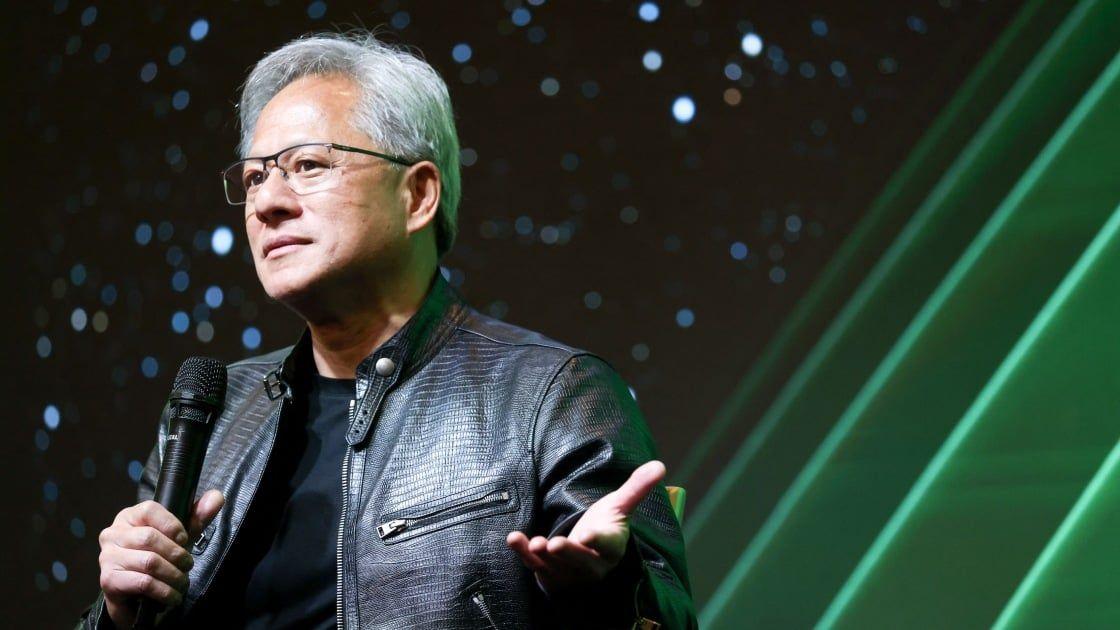Nvidia CEO Jensen Huang Predicts AI Will Increase Productivity and Busyness, Potentially Leading to 4-Day Work Weeks
3 Sources
3 Sources
[1]
Nvidia CEO Says AI Will Actually Make Us Busier in the Future
"I actually expect us to have more things to do," CEO Jensen Huang told Fox Business. Elon Musk recently insisted that our robot-filled future will allow humans to collect free money for doing nothing, while bots do all the labor. But Nvidia CEO Jensen Huang doesn't seem to be buying that narrative. In fact, Huang seems to think advancements in AI and robotics are going to mean that humans will be busier than ever in the world of tomorrow. Huang appeared on Fox Business on Thursday, where he talked about the controversy surrounding selling chips to China, Nvidia's success as a $4 trillion company, and the potential for the AI bubble to burst (he doesn't think it will, despite what Sam Altman has suggested). Huang was also asked about Nvidia's Jetson Thor "robot brain" and how robotics might revolutionize the way that we all live in the future. "I mean, we want to know how you see robots eventually, I guess, making decisions without human prompts. And where does this eventually take us?" Fox Business host Liz Claman asked. "I'm asking you to put that futurist hat on." Huang said robots would be everywhere and "everything that moves will be robotic" in the future. "There will be robotic humanoid robots that are very general-purpose. We're gonna see robotic systems of all different kinds. They're gonna be in hospitals doing robotic surgery. They're gonna be in factories building things. They're gonna be in farms doing agriculture. I mean, it's just incredible the number of robotic systems," said Huang. The Nvidia CEO went on to say that every industrial company will have factories that use robots and AI, and that his firm will be supplying the tools to make that happen, calling it a "really exciting future." But Claman wanted to know if that means people will have "more free time" from all the productivity gains. "So that really becomes the big question. How do you envision our world changing?" Claman asked. "Do we start to see every country go to a four-day workweek because productivity gains from AI have been so meaningful? I mean, do you see the chatbots become people's friends so dating apps go away? In your mind, what are those future prospects?" Claman's ideas about going to a four-day workweek are both rooted in long-held ideas of 20th-century futurism, but have also received renewed attention from guys like Elon Musk, who insist that it's precisely what's going to happen eventually thanks to AI and robots. And while Huang suggested a four-day workweek would be nice, he said humans will actually have more work in some ways. "I have to admit that I'm afraid to say that we are going to be busier in the future than now. And the reason for that is because a lot of different things that take a long time to do are now faster to do. And I'm always waiting for work to get done because I've got more ideas," said Huang. "Most countries, most companies have more ideas than we know what to pursue." Huang did try to have it both ways, insisting that he was hopeful humans would have something like a shorter workweek in the future. "And so the more productive we are, the more opportunity we get to go pursue new ideas," Huang continued. "I fully expect GDP to grow. I expect productivity to increase. I actually expect us to have more things to do. It is probably the caseâ€"and Liz, I'm hopeful for that day tooâ€"so that we have four-day work weeks. And so that we could spend more time on the weekends with family and get some reading done, and do some traveling. And nothing is better than that." But Huang put it all in historical perspective. "We came from a world of seven-day work weeks," said Huang. "And now we're in five-day work weeks. And every industrial revolution leads to some change in social behavior. But I expect the economy to be doing very well because of AI and automation. And I expect us to enrich our lives. Life quality will get better, of course, over time. Some jobs will go away. Many jobs will be new and invented. But one thing for sure, every job will be changed as a result of AI." Unlike Musk, Huang clearly doesn't believe the hype that everyone will be lounging around collecting free government money. Probably because that would require a political change, not a technological one. And it's not his job to sell politics. He's here to sell tech. Nvidia's stock price slumped on Friday as investors digested Wednesday's earnings report. Sales were strong at $46.7 billion, roughly in line with expectations from analysts, but data-center revenue didn't meet expectations, which has given AI watchers the jitters over whether the AI bubble could be about to burst.
[2]
Nvidia CEO Jensen Huang says AI will 'probably' bring 4-day work weeks: 'Every industrial revolution leads to some change in social behavior'
Nvidia CEO Jensen Huang says the world is "at the beginning of the AI revolution," and the rapid adoption of artificial intelligence across industries could bring "probably" a transition to four-day work weeks, marking another shift in social behavior akin to previous industrial revolutions. But that doesn't mean life will slow down. "I have to admit that I'm afraid to say that we are going to be busier in the future than now," Huang told Liz Claman on Fox Business Network's The Claman Countdown. He pointed to AI's uncanny ability to take time-consuming things and get them done very quickly, and predicted that the way this will actually work is to realize the ideas of more business leaders with many ideas in their heads, like himself. "I'm always waiting for work to get done because I've got more ideas," he told Claman, adding that he thinks "most companies have more ideas than we know what to pursue. And so the more productive we are, the more opportunity we get to go pursue new ideas." "Every industrial revolution leads to some change in social behavior," Huang noted in a wide-ranging interview, predicting that GDP will grow and productivity will increase. Certainly his company is growing. Huang was speaking to Claman in the aftermath of Nvidia's record $46.7 billion second quarter earnings announced just a few days beforehand. His company still has a market capitalization north of $4 trillion, the largest in the world. Bank of America Research has predicted a sweeping productivity boom for the S&P 500 as companies learn to do more with less, solving the "productivity paradox" that has been a characteristic of much of the computer age: you can see the revolution everywhere except in the productivity statistics. BofA Research's Head of US Equity & Quantitative Strategy, Savita Subramanian, told Fortune this was partially, but not entirely, due to AI. The key is the same thing identified by Huang: doing things more efficiently. "If you're productive, you are doing things more efficiently, you need less labor. And this is more labor efficiency than anything else." Huang emphasized that AI capabilities now touch nearly every sector, from cloud computing to manufacturing, robotics, and even self-driving vehicles. He detailed the explosive growth in demand for Nvidia's AI chips, especially their new Blackwell Ultra architecture (code-named GB300), fueled by surging global investments in data centers. Huang estimated that through the end of the decade, about $3 to $4 trillion of AI factory infrastructure will be built out. Looking to the future, Huang acknowledged both anxiety and excitement about AI's effect on work. The interview also touched on the geopolitical tension of chip exports to China and the Trump administration's stance on licensing. Huang positioned US technology as a potential global standard, remarking, "Having the world build AI on American tech stack helps America win." Nvidia remains eager to resume China shipments, which could reclaim a share of a $50 billion AI hardware market there. Fortune highlights that several companies pioneering the four-day work week have seen notable wins: productivity climbed by up to 24%, burnout was halved, and turnover dropped sharply. Large-scale studies in Britain and North America found that workers can accomplish the same results in around 33 to 34 hours weekly -- and the drop from five to four days led to significantly better health, job satisfaction, and a dramatic reduction in sick days and quitting rates, suggesting that the current five-day work week is largely performative. In the Netherlands, Fortune has reported, workers routinely put in just 32 hours a week, enjoying the quality-of-life improvements that come from a four-day schedule. Employees overwhelmingly want to keep the shorter week after pilot programs end and organizations that switch to them rarely revert to five days, supporting Huang's assertion that industrial revolutions bring lasting social change. Huang noted that with the advent of modern capitalism, the seven- or six-day work week evolved into a a world of five-day work weeks. "Every industrial revolution leads to some change in social behavior," he said, adding that he expects the economy to be doing very well because of AI and automation." He returned to the hotly debated impact on jobs, where Huang has been optimistic and peers such as Anthropic's Dario Amodei have predicted that 50% of white-collar work will vanish. "Some jobs will go away," Huang said. "Many jobs will be new and invented. But one thing for sure, every job will be changed as a result of AI." He added that he believes "life quality will get better, of course, over time."
[3]
Nvidia's Jensen Huang Says AI Could Spark 4 Day Work Weeks -- But Warns We'll Be 'Busier' Than Ever - NVIDIA (NASDAQ:NVDA)
Nvidia Corp. NVDA CEO Jensen Huang believes artificial intelligence could trigger a shift to four-day work weeks, but cautioned that workers will paradoxically become busier than ever as artificial intelligence accelerates business execution and idea generation. Check out the current price of NVDA stock here. AI Revolution Promises Shorter Weeks, Intensified Pace Speaking on Fox Business following Nvidia's record $46.74 billion quarterly earnings, Huang positioned the world "at the beginning of the AI revolution" that could fundamentally reshape work patterns. "I have to admit that I'm afraid to say that we are going to be busier in the future than now," Huang told host Liz Claman, highlighting AI's ability to complete time-consuming tasks rapidly. More Ideas, Less Time: The Productivity Paradox The efficiency gains won't reduce workloads but will enable leaders to pursue more ambitious projects. "I'm always waiting for work to get done because I've got more ideas," Huang explained. "Most companies have more ideas than we know what to pursue." See Also: What's Going On With Nvidia Stock? A Fortune report notes this trend aligns with Bank of America Research's predictions of an S&P 500 productivity boom as companies leverage AI to solve the longstanding "productivity paradox" where technological advances failed to boost measurable output gains. Industrial Revolution Precedent Supports Shorter Weeks Huang drew parallels to previous industrial revolutions that transformed social behaviors, noting the historical shift from seven-day to five-day work weeks under modern capitalism. "Every industrial revolution leads to some change in social behavior," he said. Real-world pilots support this prediction. Studies in Britain and North America show workers accomplish equivalent results in 33-34 hours weekly, with four-day schedules boosting productivity up to 24% while halving burnout rates. Market Impact: $4 Trillion Infrastructure Build-Out Expected Nvidia's $4.28 trillion market cap, now the world's largest, highlights soaring AI chip demand; CEO Jensen Huang forecasts $3-4 trillion in AI infrastructure investment by 2030, fueled by the company's Blackwell Ultra architecture. With a strong Momentum in the 86th percentile, Benzinga's Edge Stock Rankings indicate that Californian AI powerhouse has a positive price trend across all time frames. Track the performance of other players in this segment. Read Next: Alibaba's New AI Chip Sparks Nvidia Dip, But Ross Gerber Calls It 'Laughable' Posturing To Still Secure Blackwell Sales Photo Courtesy: glen photo on Shutterstock.com Disclaimer: This content was partially produced with the help of AI tools and was reviewed and published by Benzinga editors. NVDANVIDIA Corp$173.67-3.61%Stock Score Locked: Edge Members Only Benzinga Rankings give you vital metrics on any stock - anytime. Unlock RankingsEdge RankingsMomentum86.90Growth99.29QualityN/AValue6.66Price TrendShortMediumLongOverviewMarket News and Data brought to you by Benzinga APIs
Share
Share
Copy Link
Nvidia CEO Jensen Huang discusses the impact of AI on future work patterns, suggesting that while AI may lead to 4-day work weeks, it will also make people busier by enabling faster execution of ideas and increasing productivity.
Nvidia CEO's Vision of an AI-Driven Future
Jensen Huang, CEO of Nvidia, has shared his insights on how artificial intelligence (AI) will shape the future of work and productivity. In recent interviews, Huang painted a picture of a world where AI and robotics will be ubiquitous, potentially leading to significant changes in work patterns and social behavior
1
2
.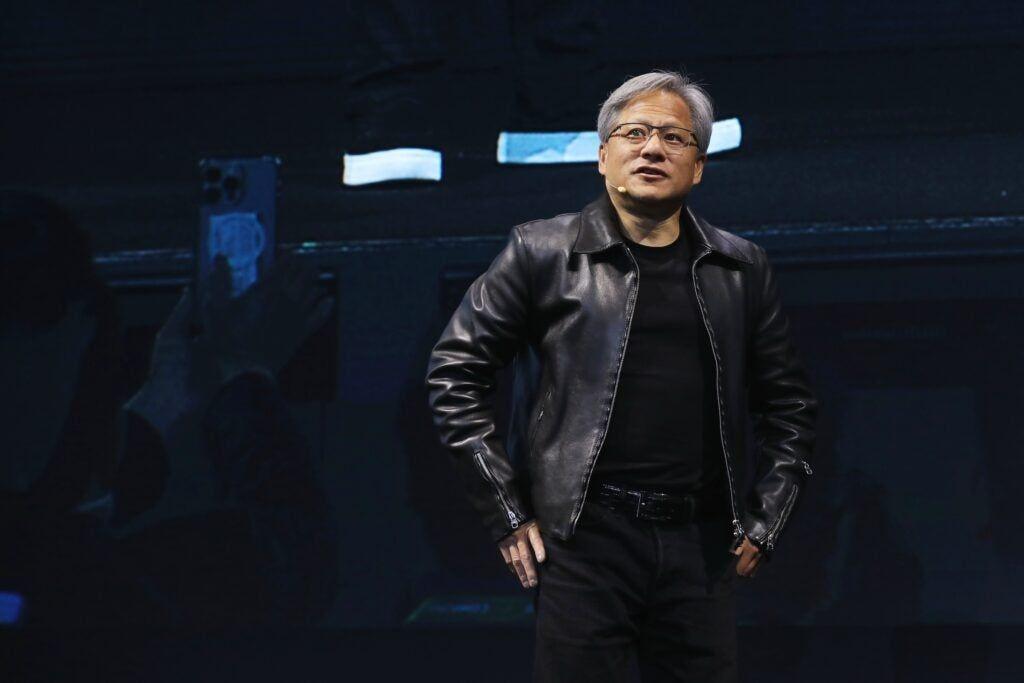
Source: Benzinga
Increased Productivity and Busyness
Contrary to the notion that AI will lead to more leisure time, Huang suggests that people might actually become busier in the future. He explains, "I have to admit that I'm afraid to say that we are going to be busier in the future than now"
1
. This increased busyness, according to Huang, will stem from AI's ability to accelerate task completion, allowing for the pursuit of more ideas and projects2
.The Potential for 4-Day Work Weeks
Despite predicting increased busyness, Huang also sees the possibility of shorter work weeks. He notes, "Every industrial revolution leads to some change in social behavior," drawing parallels to historical shifts from seven-day to five-day work weeks
2
. Huang expresses hope for four-day work weeks, allowing more time for family, reading, and travel1
.AI's Impact Across Industries
Huang envisions AI and robotics permeating various sectors:
- Healthcare: Robotic surgery in hospitals
- Manufacturing: AI-driven factories and production lines
- Agriculture: Robotic systems for farming
- Transportation: Self-driving vehicles
1
2
He estimates that by the end of the decade, about $3 to $4 trillion of AI factory infrastructure will be built out
2
.Economic Growth and Job Transformation
The Nvidia CEO anticipates significant economic growth driven by AI and automation. He predicts:
- Increased GDP
- Higher productivity
- Better quality of life
However, Huang also acknowledges that AI will lead to job market changes. "Some jobs will go away. Many jobs will be new and invented. But one thing for sure, every job will be changed as a result of AI," he states
2
.Related Stories
Nvidia's Position in the AI Revolution
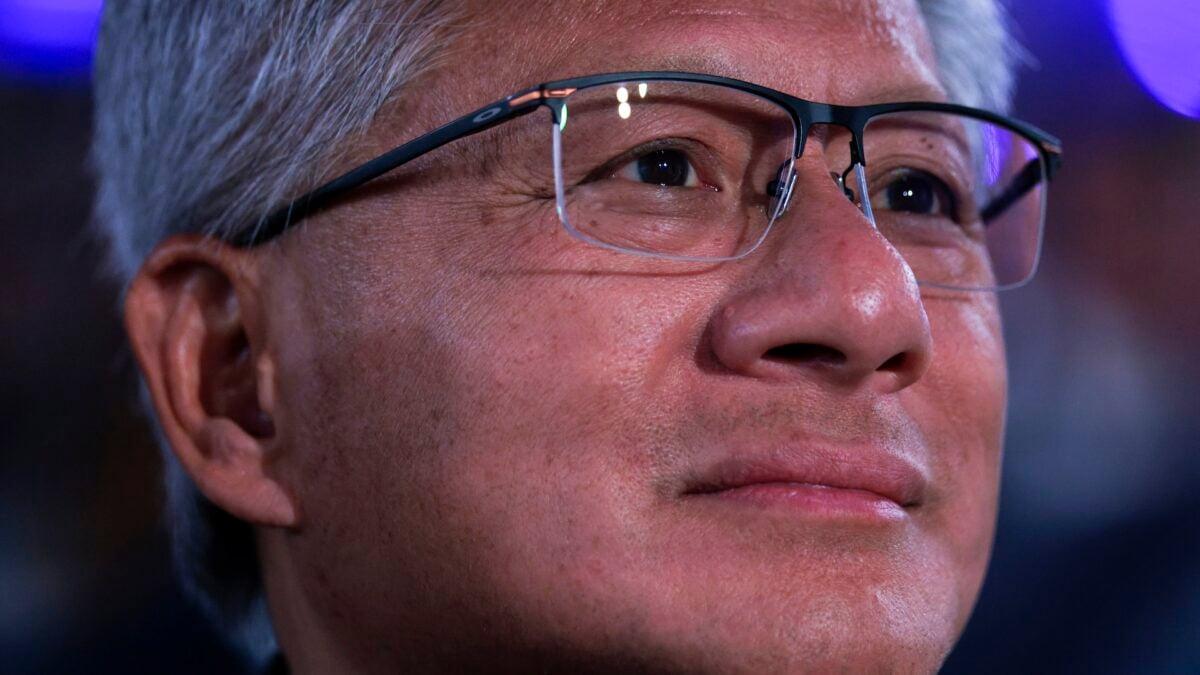
Source: Gizmodo
As a leading provider of AI chips, Nvidia is at the forefront of this technological shift. The company recently reported record quarterly earnings of $46.7 billion, underlining the growing demand for AI technologies
2
3
. Huang emphasized Nvidia's role in supplying tools for AI-driven industrial transformation and highlighted the company's new Blackwell Ultra architecture as a key driver of growth2
.Geopolitical Considerations
The interview also touched on the geopolitical aspects of AI chip production and distribution. Huang positioned US technology as a potential global standard, stating, "Having the world build AI on American tech stack helps America win"
2
. This comes amid ongoing discussions about chip exports to China and related regulatory concerns.As the world stands "at the beginning of the AI revolution," Huang's insights offer a glimpse into a future where increased productivity and shorter work weeks coexist with heightened business activity and economic growth. The full impact of this AI-driven transformation remains to be seen, but it's clear that significant changes in work patterns and social behaviors are on the horizon.
References
Summarized by
Navi
Related Stories
Nvidia CEO Jensen Huang Weighs In on AI's Impact on Jobs and Innovation
14 Jul 2025•Technology
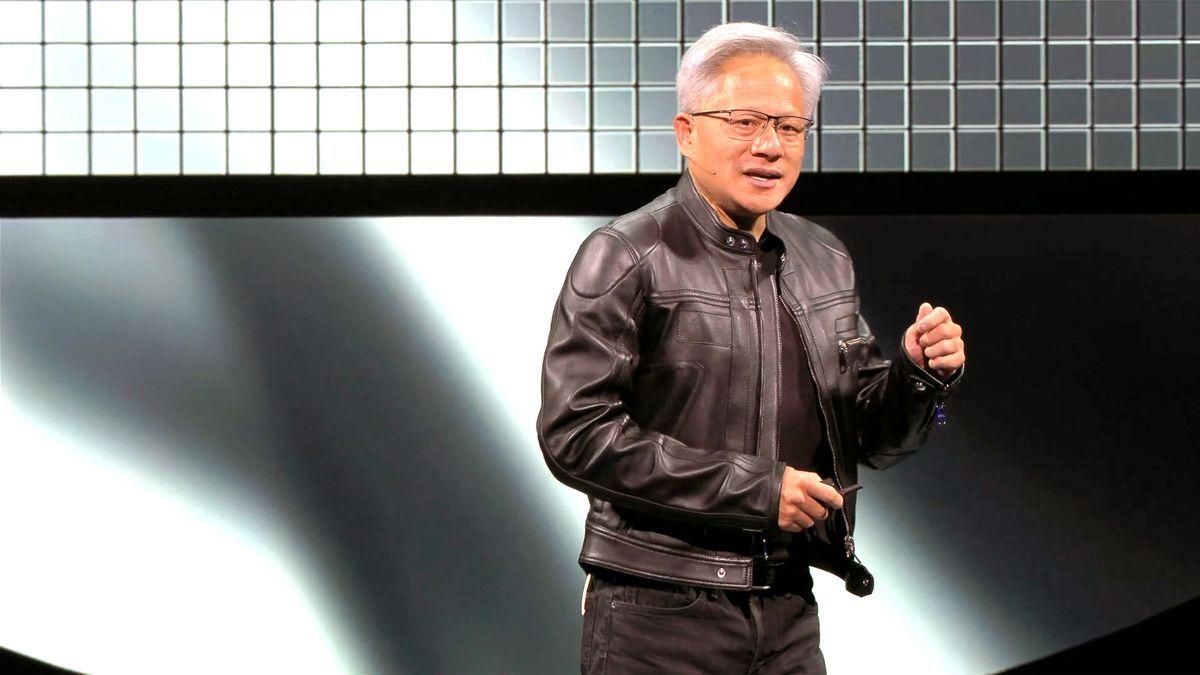
Nvidia CEO Jensen Huang Pushes for Maximum AI Automation While Promising Job Security
25 Nov 2025•Business and Economy
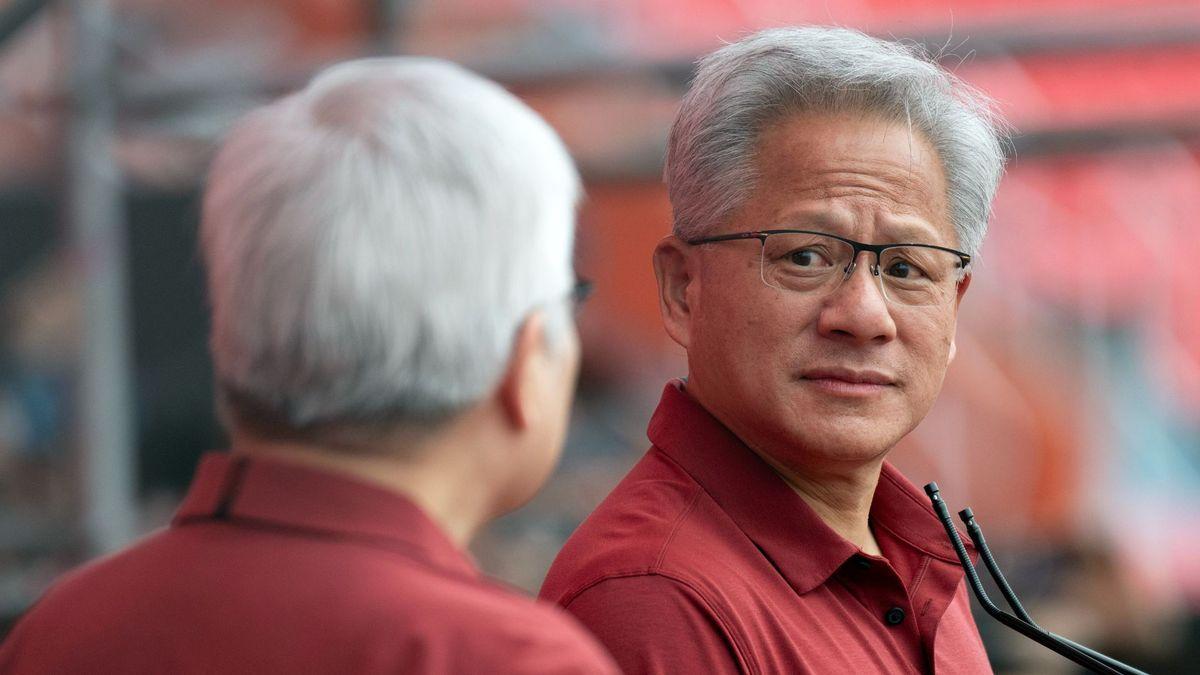
NVIDIA CEO Jensen Huang: AI Will Boost Productivity but Won't Replace Humans Entirely
25 Oct 2024•Business and Economy

Recent Highlights
1
Google Gemini 3.1 Pro doubles reasoning score, beats rivals in key AI benchmarks
Technology

2
Meta strikes up to $100 billion AI chips deal with AMD, could acquire 10% stake in chipmaker
Technology

3
Pentagon threatens Anthropic with supply chain risk label over AI safeguards for military use
Policy and Regulation

